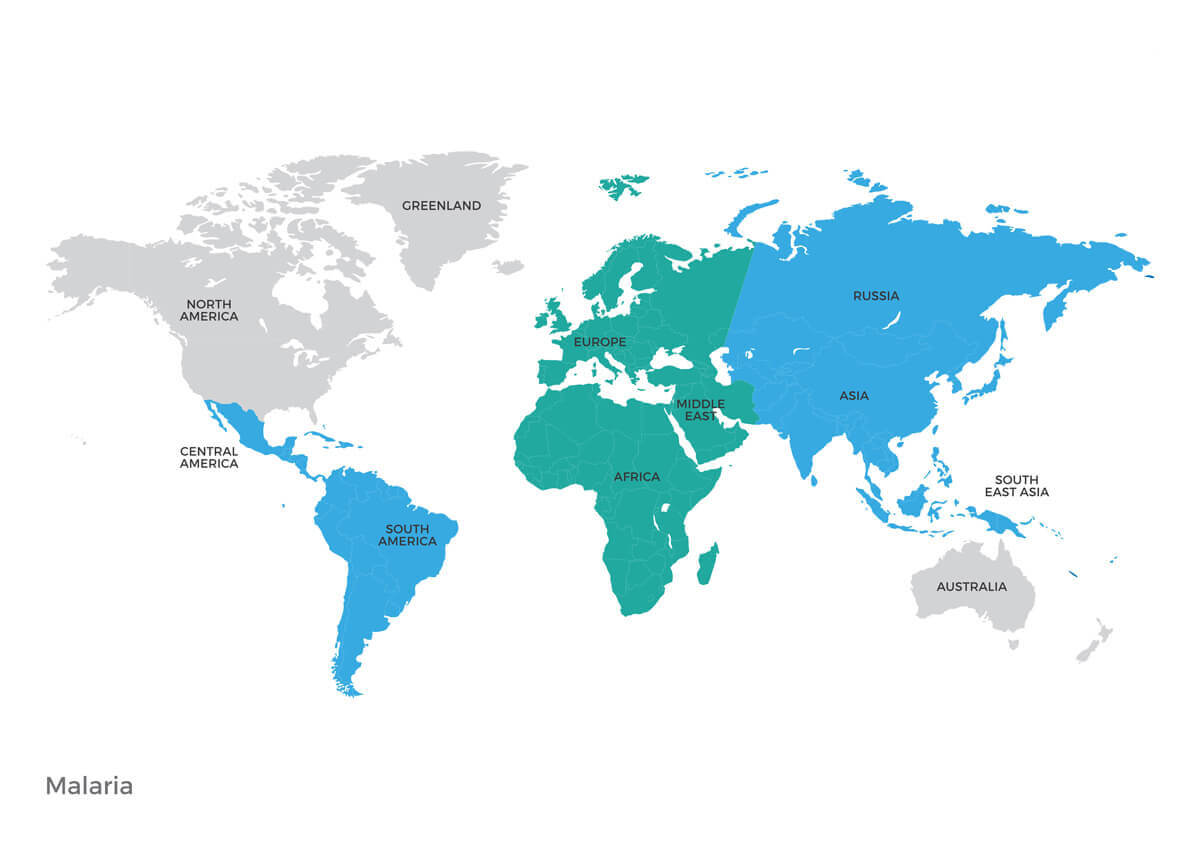What is Malaria?
Malaria is a tropical disease spread by female Anopheles mosquitoes infected with parasites called Plasmodium. These mosquitoes tend to bite at dusk or during the night time, injecting the parasite into the human bloodstream.
What are the symptoms of Malaria?
Symptoms of malaria include a high fever, headache, sweating, chills, vomiting, muscle pains, and diarrhoea. A single bite from an infected mosquito is enough to contract the disease, but the symptoms can show up 7-18 days after being bitten.
What are the treatments for Malaria?
There is no guarantee that a malaria vaccination can prevent the disease; it can just reduce the chances. However, there are several drugs available such as Malarone, Mefloquine (branded as Lariam), and Doxycycline that can be used to treat a malarial infection.
How can I prevent Malaria?
Prevention is always better than cure so, alternatively, you can stay away from stagnant water, make sure you are up to date with your vaccinations if you are entering an area where malaria is endemic, and use insect repellents and mosquito nets as precautions.
At Amiry & Gilbride Pharmacy we offer the following anti-malarial without prescription following a short consultation with our pharmacist:
- Malarone Branded & Generic
- Doxycycline
- Lariam (Mefloquine)
We also stock a range of insect repellents and mosquito nets.
Countries at risk…
Higher areas of risk of Malaria occur in Africa, South East Asia, India, and parts of South and Central America.

Travel precautions
Our recommended vaccines for the most common travel destinations outside of Europe includes Hepatitis A, Typhoid and Diphtheria, Tetanus and Polio (DTP) vaccines. For travellers who are visiting the developing world on a regular basis or for prolonged periods of time, we would recommend considering hepatitis B vaccine. Cholera is worth considering for travellers visiting rural areas of developing countries. The vaccine against cholera (Dukoral) also reduces the risk of the most common form of traveller’s diarrhoea caused by E coli. Dukoral is an oral vaccine given in two doses one week apart.
It is very important to wear insect repellent when travelling to high risk areas. Ideally insect repellents that are used should contain the chemical ingredient DEET. Any insect repellent which contains DEET 50% or more is needed in high risk areas regardless of if malaria tablets are taken or not.
Signs and symptoms
It is very important to be aware of malaria symptoms especially when travelling to high risk areas. Symptoms include fever, sweats and chills, headaches, vomiting, muscle pains and diarrhoea.
Anti-malarial medicines
- Avloclor (Chloroquine Phosphate 150mg) 2 tablets once a week
- Atovaquona (250mg) 1 tablet once a day / Proguanil (100mg) 1 tablet per day
- Adult Malarone Atovaquona (250mg) 1 tablet once a day / Proguanil (100mg) 1 tablet per day
- Child Malarone based on child’s weight
- Doxycycline (100mg) 1 tablet once a day
- Lariam (Mefloquince 250mg) 1 tablet once a week
Availability
Select your preferred pharmacy to visit their page and enquire about this service or just pop in when it suits you.
Morning Information
Malarone
Malarone is an antimalarial medication used to prevent a P. falciparum parasite infection in areas where there is resistance to other antimalarial drugs. It contains two active ingredients Atovaquone and Proguanil. These distinctly different substances work together to prevent malaria from developing in the human body.
What is Generic Malarone?
Generic Malarone contains Atovaquone and Proguanil. It is medically equivalent to Malarone, but available for a lower price. Both Malarone and Generic Malarone contain the same active ingredients and the same amount of them. They work the same way in the body to prevent a malaria infection. All generic medications available in the UK have to demonstrate equivalency before they can be sold, meaning they have the same effect in the body as the original brand. Generic medicines are as equally effective as the original.
How does Malarone work?
When an infected mosquito bites a human, it injects the parasite into the bloodstream. The treatment Malarone targets the parasite and kills it before it can grow and spread. Malarone prevents malaria from developing so it is important to start the treatment before you enter the endemic area.
How do I take Malarone?
You should start the treatment with one Malarone tablet daily 1-2 days before entering the endemic area, for the entire duration of your stay and continue for at least one week after your return from the infected area to make sure that any malarial parasite presence in your body is completely eradicated. You should take your daily dose with food to ensure maximum absorption into the body.
Malarone or Doxycycline?
Choosing an antimalarial treatment depends on your preferences and the antimalarial drug resistance present at your destination. While Malarone only needs to be taken for one week after leaving the affected area, Doxycycline needs to be taken for another 4 weeks after leaving. Also, Malarone has fewer side effects, while Doxycycline is cheaper. Another point to keep in mind is that Doxycycline can decrease the efficacy of the contraceptive pill, so Malarone is a better choice for women using this method of birth control.
What are the side effects of Malarone?
All antimalarial medication have some side effects and Malarone is no different. Common side effects include:
- nausea
- headache
- stomach pain
- diarrhoea
Can I take Malarone if I am pregnant?
You should not take Malarone if you are pregnant or breastfeeding, unless your doctor recommends it.
Product Information
View the patient information leaflet for Malarone.
Doxycycline
What is Doxycycline and what is it used for?
Doxycycline is from the tetracycline antibiotics series; broad spectrum antibiotics which can be used to treat a wide range of bacteria-caused infections including malaria.
How does it work?
When a mosquito infected with malaria bites a person it passes the malaria parasite into the human bloodstream. Doxycycline targets this malaria parasite and kills it. It is used to prevent a malarial infection from developing, which is why it is important to start taking it before entering an area that has malaria-infected mosquitoes and why it is also important to continue taking it for up to 4 weeks after your return.
How should I take Doxycycline?
You should avoid alcohol while you are taking Doxycycline tablets. Take them with water or food if the tablets irritate your throat. Also, you should take them standing up or sitting up and not lie down for at least half an hour after taking a Doxycycline tablet. Take a daily dose of 100mg starting 1-2 days before exposure to a malaria endemic region, throughout your stay and continuing the treatment for 28 days after leaving the malaria prone area.
Malarone or Doxycycline?
Doxycycline is only used for areas that are resistant to Chloroquine or with P. falciparum strains resistant to multiple drugs. Also, Doxycycline is cheaper, but has more side effects than Malarone.
Side effects
- anxiety
- nausea
- vomiting
- sensitivity to light
Nausea can be minimised by taking the Doxycycline with food.
Can I take Doxycycline if I am pregnant?
You should not take Doxycycline if you are pregnant or breastfeeding, unless your doctor recommends it
Product Information
View the patient information leaflet for Doxycycline Capsules BP 100mg
Lariam (Mefloquine)
What is Lariam and what is it used for?
Lariam is an antimalarial medicine used to treat and prevent the development of the malarial parasite P. falciparum in areas with antimalarial drug resistance. It contains the active substance Mefloquine hydrochloride at a dose of 250mg.
How does it work?
When an infected mosquito bites a person, it passes the parasite onto its human target. The choice of antimalarial drug depends on the sensitivity of the malaria parasite in your destination area. Lariam targets the malarial parasite and destroys it.
How do I take Lariam?
Those that have a body weight more than 45kg should take one 250mg tablet once a week on the same day, starting 2 to 3 weeks before entering the malaria-affected area, so you can be sure that you tolerate the medication well before arriving at your destination. Continue the treatment through your stay and 4 weeks after returning. It is recommended that you swallow the tablets whole with plenty of water, preferable after a meal.
How is Lariam different from Malarone?
Although they are both medications used to treat or prevent malarial development in the human body, they have different active ingredients and directions for administration. Also, Lariam has more side effects than Malarone, which are more severe as well.
Contact your doctor if:
If you get any side effects at any time during your treatment, stop taking the treatment immediately and contact your doctor or pharmacist.
Contact your doctor if you experience changes in mood and behaviour, mental problems, or fits. Other signs that you should cease taking Lariam include: suicidal thoughts, severe anxiety, feeling restless, depression, confusion, unusual behaviour, mistrusting others, self-endangering behaviour, and hallucinations.
If you are unsure of treatment with Lariam, you feel that the cautions on the medication apply to you, or if you have had any mental side effects from the medication listed on the patient information leaflet, consult your GP or pharmacist for advice.
Ask your doctor for a replacement antimalarial for as long as you are in the country where malaria is a risk.
Side effects
Lariam has more side effects than other antimalarial medications. These side effects that can affect one in ten people using the drug and include:
- stomach pain
- headache
- nausea
- vomiting
- severe anxiety
- depression
- sleeping problems
- dizziness
If you experience any of these whiles on treatment, stop taking Lariam immediately and contact your doctor, who can also provide you with a replacement antimalarial for the period of your stay in a malaria-prevalent region.
Can I take Lariam if I am pregnant?
You should NOT take Lariam if you are pregnant or breastfeeding. If you are considering becoming pregnant you should wait at least 3 months after the last dose.
Product Information



